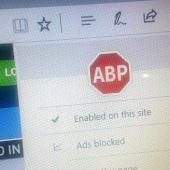-
Take an extra $5 off this ad-blocking DNS for Presidents' Day
A five-year subscription to AdGuard DNS is currently on sale for $29.99 (reg. $719.64) but new users can get it for $24.97 if they sign up by Feb. 19.
- February 15, 2024
- 07:09 AM
 0
0
-
Block ads with $263 off the Awesome AdGuard Bundle
There's a lot out there online that puts you at risk, some of it intentional and some not. Deal with both with this three-year AdGuard subscription bundle for $29.99, $263 off the $293 MSRP.
- February 08, 2024
- 02:09 PM
 0
0
-
Save up to $112 in this extended AdGuard Cyber Week deal
Protect your gear with an AdGuard lifetime subscription protecting up to three devices for $12.97, $47 off the $59.99 MSRP. Or get a lifetime AdGuard family plan that defends up to nine devices for $16.97, $112 off the $129 MSRP. But both deals are done at the end of today, so act fast.
- December 03, 2023
- 08:07 AM
 0
0
-
Save $112 on a lifetime subscription to AdGuard's ad blocker
Ads don't have to be frustrating or dangerous. This AdGuard lifetime subscription takes back control of your browser for $16.97, $112 off the $129 MSRP, a price you can only get now through the end of December 3rd.
- November 14, 2023
- 07:19 AM
 0
0
-
Block ads for life with this $30 AdGuard subscription deal
Right now an AdGuard Family Plan lifetime subscription is on sale for just $29.99 (reg. $129).
- September 01, 2023
- 07:14 AM
 1
1
-
YouTube tests restricting ad blocker users to 3 video views
YouTube is currently running what it describes as a "small experiment globally," warning users to toggle off their ad blockers and avoid being limited to only three video views.
- June 29, 2023
- 02:59 PM
 16
16
-
YouTube tests blocking videos unless you disable ad blockers
YouTube is running an experiment asking some users to disable their ad blockers or pay for a premium subscription, or they will not be allowed to watch videos.
- May 10, 2023
- 03:43 PM
 20
20
-
Google to test disabling Chrome Manifest V2 extensions in June 2023
Developers of extensions for Google Chrome can keep their hopes up that the transition from Manifest V2 to V3 will be as gradual as possible, helping to minimize the negative impact on the community of users.
- September 28, 2022
- 01:00 PM
 0
0
-
AdGuard’s new ad blocker struggles with Google’s Manifest v3 rules
AdGuard has published the first ad blocker extension for Chrome that is compatible with Manifest V3, Google's newest extension platform protocol for the world's most popular web browser.
- August 31, 2022
- 01:52 PM
 9
9
-
Clean your internet experience with this DNS-based ad blocker deal
As technology advances, so will the privacy and data risks associated with it. A Control D two-year subscription blocks annoyances and filters out risks for $30, 37% off the $48 MSRP.
- June 09, 2022
- 07:11 AM
 0
0
-
Malicious Chrome ad blocker injects ads behind the scenes
The AllBlock Chromium ad blocking extension has been found to be injecting hidden affiliate links that generate commissions for the developers.
- October 14, 2021
- 10:35 AM
 1
1
-
Google Chrome will block resource-heavy ads starting August
The Google Chrome web browser will start unloading ad iframes using too many system resources without the user's knowledge starting with the stable release coming near the end of August.
- May 14, 2020
- 01:42 PM
 0
0
-
uBlock Origin 1.25 Now Blocks Cloaked First-Party Scripts, Firefox Only
uBlock Origin 1.2.5 has been released with a new feature that blocks first-party tracking scripts that use DNS CNAME records to load tracking scripts from a third-party domain and bypass filters.
- February 25, 2020
- 11:18 AM
 0
0
-
Mozilla Will Support Existing Ad Blockers in Extensions Manifest v3
Mozilla has decided to split from Google and continue to support existing ad blockers in the upcoming extension changes being proposed by Google as part of the Extensions Manifest v3.
- September 04, 2019
- 08:46 AM
 5
5
-
Google Chrome to Unload Heavy Ads With Intensive Resource Usage
Google is currently working on adding a new feature to the Chrome web browser designed to automatically unload ad iframes which use an outrageous amount of system resources in an effort to shrink the browser's CPU and network footprint.
- July 04, 2019
- 03:55 PM
 0
0
-
Google AdSense Warns That Chrome to Block Abusive Ads on July 9
In 2018, Google Chrome started blocking abusive ad experiences on some sites in North America and Europe. Starting July 9, Google will be expanding Chrome's built-in ad blocking efforts to all other regions and ads will be blocked on sites that have performed abusive behavior.
- July 02, 2019
- 03:45 PM
 0
0
-
Chrome Ad Blockers To Get Full API Access via Free Enterprise Policies
Google says that it will allow enterprise admins to use the fully-featured webRequest ad blocking API for free even after the Manifest V3 Chrome Extensions platform changes will take effect.
- June 02, 2019
- 10:25 AM
 0
0
-
Google to Allow webRequest Ad Blocking for Enterprise Deployments
Google will deprecate all blocking capabilities in the webRequest API as part of future Chrome Extensions platform Manifest V3 changes, with enterprise deployments being the exception to the rule.
- May 29, 2019
- 02:40 PM
 1
1
-
Adblock Plus Filters Can Be Exploited to Run Malicious Code
An exploit has been discovered that could allow ad blocking filter list maintainers for the Adblock Plus, AdBlock, and uBlocker browser extensions to create filters that inject remote scripts into web sites.
- April 15, 2019
- 08:48 PM
 9
9
-
Chrome Extension Manifest V3 May Break uBlock Origin Content Blocker
The Google Chrome development team is working on making some changes to the Chrome Extensions platform that would end the functionality of ad-blockers like uBlock Origin and uMatrix, if implemented as defined in the current draft document.
- January 22, 2019
- 09:57 PM
 2
2
- 1
- 2





















